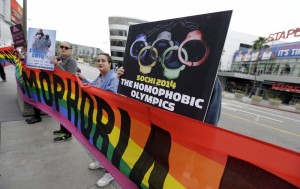By Kiley Crossland
(WNS)–The International Olympic Committee (IOC) voted in December to add “sexual orientation” to the Olympic Charter. The decision comes after pressure from gay advocacy groups following Russia’s prohibition of gay propaganda during the 2014 Sochi Winter Olympics.
The change, part of a 40-point reform package pushed by IOC President Thomas Bach, passed by a unanimous 96-0 vote and reworded one of the “Fundamental Principles of Olympism.” The clause now states: “The enjoyment of the rights and freedoms set forth in this Olympic Charter shall be secured without discrimination of any kind, such as race, color, sex, sexual orientation, language, religion, political, or other opinion, national or social origin, property, birth, or other status.”
Countries hoping to host the games must abide by the Olympic Charter. Opponents of the change say the new standard will mean countries bidding for the Olympics will be required to have pro-homosexual laws in place. This may affect bids from the two finalists for the 2022 Winter Games: Almaty, Kazakhstan, and Beijing, China. The United States Olympic Committee has decided to make a bid for the 2024 Summer Games. Boston, Los Angeles, San Francisco, and Washington are all under consideration as host cities.
 “There is no greater sign of progress in combating homophobia in sports than to have the oldest organized athletic competition in the history of the world saying enough is enough,” said Hudson Taylor, executive director of the gay rights group Athlete Ally, in a statement following the announcement. Athlete Ally co-launched a campaign last year petitioning Russia to withdraw legislation banning the promotion of homosexuality to minors. The group also encouraged the IOC to update its anti-discrimination clause to explicitly include “sexual orientation” as well as “gender identity,” according to Reuters. The IOC did not include “gender identity,” which would have protected transgendered athletes.
“There is no greater sign of progress in combating homophobia in sports than to have the oldest organized athletic competition in the history of the world saying enough is enough,” said Hudson Taylor, executive director of the gay rights group Athlete Ally, in a statement following the announcement. Athlete Ally co-launched a campaign last year petitioning Russia to withdraw legislation banning the promotion of homosexuality to minors. The group also encouraged the IOC to update its anti-discrimination clause to explicitly include “sexual orientation” as well as “gender identity,” according to Reuters. The IOC did not include “gender identity,” which would have protected transgendered athletes.
When asked about how the IOC would enforce the new principle, member Barry Maister of New Zealand said he had no idea.
“But I think the IOC often does things it can’t enforce yet can take a leadership role with,” Maister told the Chicago Tribune. “It can articulate and advocate and push for change regardless of the implementation of it. It’s the logical thing to do in today’s world.”
Other changes in the recent IOC decision include efforts to make the games more affordable to host. Right now the price tag, in the tens of billions of dollars, is cost-prohibitive for much of the world, including many countries that hold to traditional marriage and might be seen as discriminatory.
While the long-term effect is still unknown, the IOC vote did not come as much of a surprise. “I would expect the international sports community to go down this road,” Tim Pitcher, spokesman for the Christian organization Athletes in Action, told me.
When asked whether Olympic athletes could face discrimination for their beliefs, Pitcher said Christian Olympians have to walk a fine line. They must figure out how to appropriately live out and share their Christian faith while abiding by their league’s guidelines, he said.
Many think pressure to accept transgendered individuals is the next step for the IOC, an issue Pitcher calls “Pandora’s box.” The inclusion of transgendered athletes in gender-specific sports has implications for Christians, as well as the Olympic Games as a whole.







